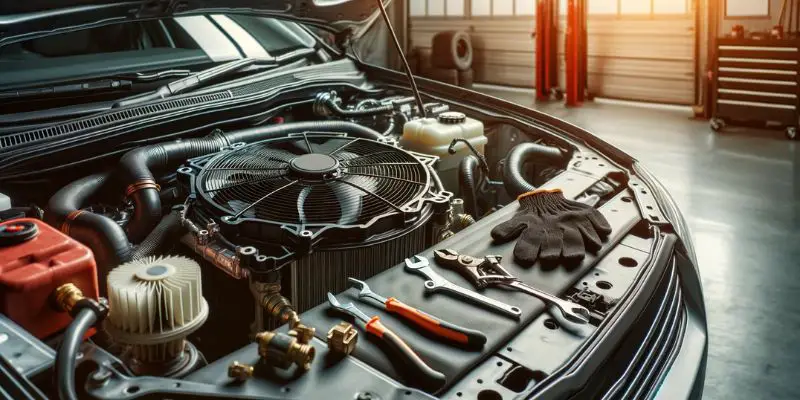As an experienced automotive expert, I’ve encountered numerous queries regarding vehicle cooling systems.
A common question is, “Should a radiator fan turn on when AC is on?”
The radiator fan should turn on when the AC is on in most vehicles. This activation helps manage the additional heat generated by the AC system, aiding in maintaining the engine’s optimal temperature. However, factors like vehicle design, ambient temperature, and system health can affect function.
Keep reading to learn everything you need to know about the connection between your radiator fan and AC.
The Crucial Role of Radiator Fans with AC (Important)

It’s essential to understand the radiator fan’s function in a vehicle.
The primary role of the radiator fan is to cool the engine by drawing air through the radiator, especially when the car is stationary or moving slowly.
When the AC is on, the demand for cooling increases.
In most vehicles, the radiator fan will indeed turn on when the AC is activated.
This is because the air conditioning system adds an additional thermal load to the engine, which the cooling system must compensate for.
- Increased Thermal Load: When the AC is running, it generates extra heat, which must be dissipated to prevent the engine from overheating.
- Ensuring Efficiency: The fan aids in maintaining an optimal operating temperature, ensuring the AC system works efficiently without overloading the engine.
Situations Where the Radiator Fan May Not Turn On
There are exceptions and specific circumstances where the radiator fan might not turn on immediately or at all when the AC is on.
Vehicle Design Variations
- Make and Model Differences: Some vehicle designs have sophisticated cooling systems that manage temperatures differently. Depending on the make and model, the radiator fan might not need to activate immediately or under certain conditions.
- Advanced Control Systems: Modern vehicles with advanced thermal management systems might delay the fan activation to optimize energy consumption and efficiency.
Ambient Temperature Factors
- Low Ambient Temperatures: In cooler ambient conditions, the engine might not require additional cooling from the fan when the AC is on, as the thermal load is lower.
- Thermostat Settings: The vehicle’s thermostat and temperature sensors play a crucial role. If the engine hasn’t reached a certain temperature threshold, the fan might not engage.
Why the Radiator Fan Might Not Turn On When AC Is On
Despite the general expectation for the radiator fan to operate with the AC, there are scenarios where it might not happen due to various reasons.
Potential Causes for Non-Activation
- Faulty Cooling Fan Relay: A common reason is a malfunctioning relay that controls the fan’s power supply. If this relay fails, the fan won’t activate despite the AC running.
- Thermostat Issues: A faulty thermostat that doesn’t accurately gauge the engine temperature can fail to signal the fan to turn on.
- Sensor Malfunctions: Temperature sensors are critical in signaling the need for additional cooling. If these sensors are defective, they won’t trigger the fan.
- Electrical Problems: Wiring issues, such as corroded connections or damaged wires, can prevent the fan from receiving power.
Troubleshooting and Fixes
To address these issues, a systematic approach is necessary.
Checking the Cooling Fan Relay
- Inspection and Replacement: Test the relay using a multimeter or replace it if you suspect it’s faulty. Relays are usually not expensive and are relatively easy to replace.
Thermostat Assessment
- Monitoring Engine Temperatures: Use a diagnostic tool to monitor the engine temperature. If the temperature readings are erratic or don’t match the expected values, consider replacing the thermostat.
Sensor Checks
- Testing Temperature Sensors: Similar to the thermostat, use diagnostic tools to check the temperature sensors. Inconsistent readings can indicate faulty sensors, necessitating replacement.
Electrical System Evaluation
- Visual Inspection and Testing: Check for any visible signs of damage to the wiring. Use a multimeter to test the continuity of the electrical connections. Repair or replace any damaged components as needed.
By understanding these various scenarios and troubleshooting methods, you can effectively determine why a radiator fan might not turn on when the AC is running and how to address any issues that arise.
Remember, vehicle cooling systems are complex.
And it’s always recommended to consult a professional mechanic for intricate problems.
Preventive Maintenance Tips
Let’s go over some tips for maintaining your radiator fan and preventing future problems.
Routine Checks
Regular maintenance is key to ensuring your vehicle’s radiator fan and AC system function optimally.
Here’s what you should routinely do:
- Inspect the Radiator Fan: Check for any visible damage, cracks, or obstructions. Ensure the fan blades are intact and clean. Dust and debris can accumulate over time, reducing efficiency.
- Coolant Level and Quality: Regularly check the coolant level in the reservoir. The coolant should be at the appropriate level and not appear muddy or discolored. Change the coolant as per the manufacturer’s recommendation.
- Radiator and Condenser Check: Ensure the radiator and condenser are free from dirt, leaves, or debris. A clogged radiator or condenser can significantly impact cooling efficiency.
- Belt Inspection: For vehicles with a belt-driven fan, inspect the belt for any signs of wear, cracks, or fraying. A malfunctioning belt can affect fan operation.
Seasonal Maintenance Advice
Extreme temperatures can stress your vehicle’s cooling system.
Here’s how to prepare:
- Summer Readiness: Before the hot weather hits, ensure the coolant level is correct and the mixture is appropriate for summer. Check the operation of the radiator fan and AC system. Consider a professional AC system service to ensure it’s charged and functioning correctly.
- Winter Preparations: Winterize your vehicle by ensuring the coolant has the correct antifreeze mixture. This prevents freezing and ensures proper engine and heater operation. Check the heater and defroster system, as they play a crucial role in winter driving.
Advanced Troubleshooting Techniques
There are also some more advanced ways to troubleshoot your radiator fan.
For Experienced DIYers
If you’re well-versed in car maintenance, here are advanced methods to diagnose cooling system issues:
- Diagnostic Tools: Use an OBD2 scanner to read any error codes related to the cooling system. These codes can provide specific insights into what might be malfunctioning.
- Electrical Testing: Use a multimeter to check the electrical connections to the fan, including the relay and fuses. A continuity test can reveal issues like broken wires or poor connections.
- Coolant System Pressure Test: This test can help identify leaks in the cooling system that might not be immediately visible but can affect cooling efficiency.
Common Misdiagnoses
Sometimes symptoms might point to a radiator fan issue, but the problem lies elsewhere:
- AC Compressor Failures: If the AC isn’t cooling efficiently, it’s easy to blame the fan. However, the issue might be with the AC compressor or the refrigerant level.
- Thermostat Problems: Inaccurate temperature readings might suggest a fan issue, but the real culprit could be a faulty thermostat.
- Cooling System Leaks: Leaks can reduce the effectiveness of the cooling system, leading to overheating. It’s not always the fan’s fault.
Check out this video about your radiator fan not kicking on with your AC:
Q&A Section: Bad Radiator Fans
Q: My radiator fan runs constantly, even when the engine is cool. Is this normal? A: Constant fan operation is not typical. It could indicate a faulty temperature sensor, a stuck relay, or a problem with the car’s computer system.
Q: Can a bad radiator fan affect my car’s AC performance? A: Yes, if the radiator fan isn’t working correctly, it can lead to the engine running hot, which in turn can affect the AC’s efficiency.
Q: How often should I replace the coolant in my car? A: It varies by vehicle and coolant type, but generally, it’s recommended every 30,000 to 50,000 miles or as specified in your vehicle’s manual.
Final Thoughts: Should a Radiator Fan Turn On When AC Is On?
In my years of tinkering under the hood, I’ve noticed that the simplest signs of a struggling radiator fan often go unnoticed, like a slightly warmer than usual engine or a subtle decrease in AC efficiency.
Keep that in mind the next time you run into radiator issues.
I hope you found this guide super helpful. Thanks for reading!
Read This Next:
- What Happens If Your Radiator Fan Stops Working? (10 Things)
- How to Check If Your Radiator Fan Is Working (10 Best Ways)
- Why Is My Car Fan So Loud? (13 Reasons and Solutions)
- 4 Common Problems With Cars in the Cold (Solved & Explained)
Sources
Research Gate – Research on Radiator Fans
